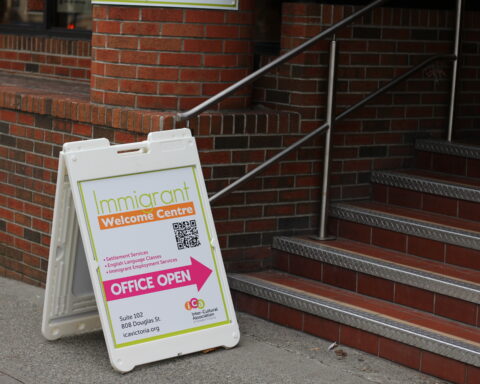Depression and mental health problems increased after Syrian refugees who had fled traumatizing circumstances arrived in Canada, according to a study by the Immigrant Services Society of B.C.
The report, Sustaining the Welcome, is based on yearly interviews with 1,665 resettled Syrians between 2017 and 2020. The research, conducted in partnership with York University’s Syrian Refugee Integration and Long-term Health Outcomes and funded by the Canadian Institutes of Health Research, aimed to understand how Syrian refugees experienced life in Canada in the years after their initial arrival.
The organizations also wanted to better understand how their physical, mental, economic, and social well-being changed over time.
Jennifer Hyndman, one of the researchers involved in the four-year study, said the conditions of reception in Canada cause depression and anguish for newcomers, not necessarily the pre-arrival circumstances.
“Our research team did not set out to examine just mental health and depression, but in fact ‘well-being’ and integration into Canadian society were the main foci,” Hyndman said.
“Before this project research had been done showing that most refugees who arrived from Syria may have experienced very stressful circumstances, but their mental health was not badly affected.”
According to researchers, the rates of clinical depression-level symptoms increased as resettled refugees spent more time in Canada. This confirmed the importance of post-migration factors in shaping the long-term well-being of resettled refugees, they said.
The study found that Syrian refugees have higher levels of depression and health concerns than the general Canadian population, as well as unmet health needs.
Between 2015 and 2017, Canada welcomed more than 47,000 refugees through Operation Syrian Refugee. Ontario, Quebec and British Columbia received the highest numbers of resettled refugees.
The research found that Syrian refugees fleeing war and persecution may have been exposed to traumatizing experiences which affected their health and well-being, and may contribute to the high rates of depression.
Judi Khalil, a 25-year-old Syrian refugee who participated in the survey, came to Canada in 2016. Despite the warm welcome and support, he went through difficulties that caused stress and depression.
“Upon arriving in Canada as an immigrant, I faced myriad challenges, including homesickness, cultural adjustment and the daunting task of building a new life, Khalil said. “The initial phase was marked by moments of loneliness and a longing for the familiar.”
Khalil said he felt that he did not belong anywhere and lost his identity because he was a Syrian Kurd — a minority in north Syria — as a refugee living in Turkey for three years before coming to Canada.
“I have faced this challenge when people asked me where I was from,” he said. “I did not know to say a Kurd, Syrian, a Turk or a Canadian. It always took me time to explain.”
Khalil participated in the survey to share his journey and how he coped with his depression. After he settled Khalid supported other refugees and became a pilot. He is now planning to become a missionary pilot.
The report recommends several policy initiatives to address these barriers, including increased mental health support and programs aimed at developing refugee friendship networks.
Many Syrian immigrants, like others, experienced depression because they couldn’t apply their prior experiences and certificates in Canada.
The research included a quote from an immigrant who couldn’t use their certificate: “I studied psychology and accounting, I used to teach in Syria and was the head of a department in Lebanon. But it means nothing here. I must study some other major to work. It’ll take me 15 years to finish majoring in psychotherapy.”
Hyndman said that all participants highly valued social networks and friendships for the economic and social benefits they provided, although women experienced greater social isolation due to additional caregiving responsibilities.
The report offers several recommendations including expanding the language instruction for newcomers to Canada to offer online and evening classes and home tutors. Expanding childcare options for learners would also reduce systemic barriers to women’s participation.
It also said the government should fund a Canada-wide settlement-informed refugee mental health program specifically adapted to meet refugee newcomer needs, for up to five years.
Diary Marif is an Iraqi Kurdish journalist based in Vancouver, Canada. His writing has appeared in the Awene weekly, Livin, and on KNNC TV as a documentary researcher by the name Diary Khalid. Diary earned a master's degree in History from Pune University, in India, in 2013. He moved to Vancouver in 2017, where he has been focusing on nonfiction writing. He can be found on Twitter: @diary_khalid.






